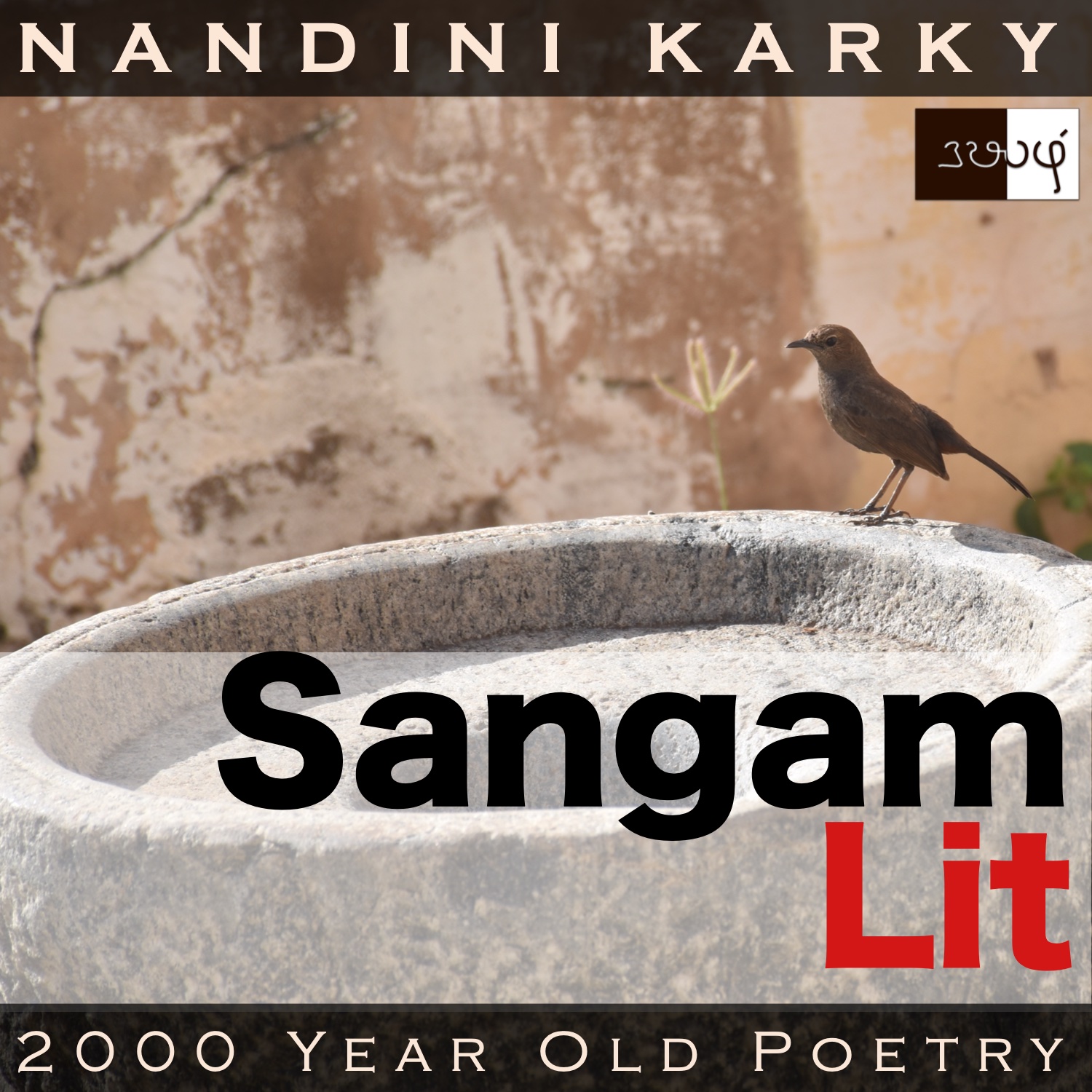Podcast: Play in new window | Download
Subscribe: Apple Podcasts | Spotify | Amazon Music | Android | iHeartRadio | TuneIn | RSS | More

In this episode, we learn of a unique song, sung by women as they hull grain in a mortar, as portrayed in Sangam Literary work, Kurunthogai 89, penned by Paranar. The verse is situated in the farmlands of ‘Marutham’ and speaks in the voice of the confidante to herself, while conveying a pointed message to the man, listening nearby.
பா அடி உரல பகுவாய் வள்ளை
ஏதில் மாக்கள் நுவறலும் நுவல்ப;
அழிவது எவன்கொல், இப் பேதை ஊர்க்கே?-
பெரும் பூண் பொறையன் பேஎம் முதிர் கொல்லிக்
கருங் கட் தெய்வம் குடவரை எழுதிய
நல் இயல் பாவை அன்ன இம்
மெல் இயல் குறுமகள் பாடினள் குறினே.
A soulful song to the beat of a pestle on stone echoes from this verse! In the opening words, ‘பா அடி உரல்’ meaning ‘a stone mortar with a wide base’, we glimpse at an ancient tool for food processing, which is a common fixture in rural homes in Tamilnadu even today. The phrase ‘பகுவாய் வள்ளை’ meaning ‘open-mouthed vallai’ talks about the unique type of song mentioned earlier, which is a song sung by women as they pound grain on a mortar. Thereafter, we meet a historical character in ‘பெரும் பூண் பொறையன்’ referring to ‘a Chera King, bedecked with jewels’. His jewellery seems to be his claim to fame! In addition to this historical character, we also meet with a historical place ‘கொல்லி’, the same Kolli hills, in the current Namakkal district of Tamilnadu. A statue that we have repeatedly encountered in other Sangam verses makes an appearance here in ‘நல் இயல் பாவை’ meaning ‘a statue, depicting someone with a good nature’. Ending with the words ‘மெல் இயல் குறுமகள் பாடினள் குறினே’ meaning ‘soft-natured young maiden sings as she pounds’, the verse fills us with curiosity to listen to this lady’s melody.
Wide-based mortars and open-mouthed songs seem to zing with life in this verse! The context reveals that the man and lady had been leading a love relationship and that the man had been trysting with the lady for quite a while. Deciding it’s time to nudge the man in the right direction, one day, the confidante, seeing the man arrive at the lady’s house, pretending not to notice him, but making sure he’s in earshot, says to herself, “Near the broad-based grinding mortar, hearing ‘vallai’ songs, strangers around spread slander. Akin to the good-natured statue of the black-eyed goddess, sketched on the western slope of the terrifying Kolli hills, in the domain of ‘Poraiyan’, bedecked with great many jewels, is this gentle-natured young girl. Why should this foolish village fret over the song this good girl sings as she pounds away?” With these words, the confidante is informing the man that slander is spreading in town about his relationship with the lady and that, instead of indulging in temporary pleasures of trysting, the man must turn towards seeking the permanent happiness of marriage.
Why should a lady’s song cause the village to buzz with gossip? Let’s investigate by listening to the confidante’s words carefully. She mentions that after hearing the ‘vallai’ songs, sung as the grain is pounded on the stone, strangers are now spreading slander. Without mentioning who is doing the singing, she asks the question, ‘why does the foolish village care?’ Then, she goes on to describe who is singing that song. Saying that it’s a girl with a gentle nature, who has the beauty of the famous statue of a black-eyed goddess in the Kolli hills, which happens to be in Poraiyan’s domain! Now, as we can clearly see, the confidante leaves no doubt that this gentle girl is none other than the lady herself, and the listening man would figure as much!
To unravel why ‘vallai’ songs have invited this slander, we need to understand that such songs had the content of a woman singing about the man in her heart. Also, did you notice how the verse describes this song as an ‘open mouthed’ one? It makes me think of the modern opera! I doubt if the ‘vallai’ songs were so high-pitched but definitely sung from the stomach, with full feeling. So much emotion on display, a sure-fire invitation for the tongues of strangers to start to speak slander. As if grumbling about this nature of her village people, the confidante asks ‘what do they care if the lady sings about the man she loves?’ With that, she leaves no room for doubt in the man’s heart about the lady’s mature love for him and thereby, leaving the man would find myself moved to take steps in the right direction! Reading this verse makes one yearn to listen to such ancient songs. In a related theme, I heard a ‘waulking song’ in a web-series based on the Scottish highlands in the 1700s, wherein women sit around a long rolled sheet of wool and sing a song as they beat against the wool to process it. I’m sure such songs are still lingering in tiny, remote corners of the world, which are still untouched by the whirring efficiency of grinders and machines. What a delight it would be for generations to come, if someone could capture these songs, before they are lost in the mists of time and technology!




Share your thoughts...